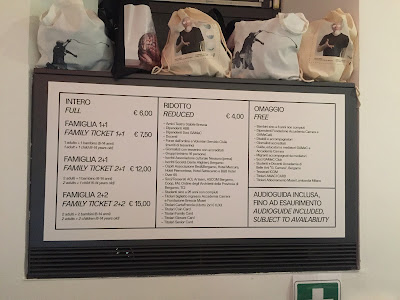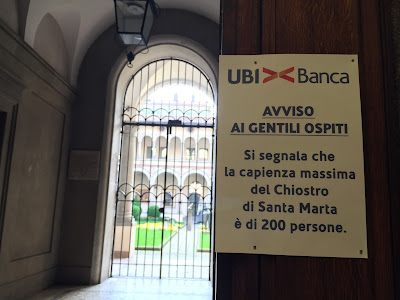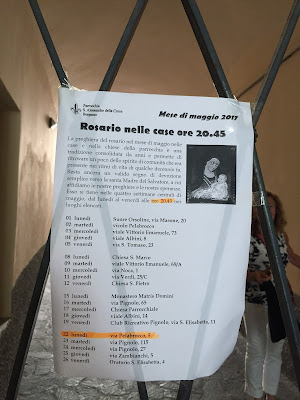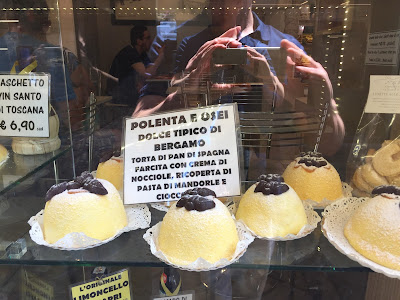previous lesson | this lesson | next lesson
Wow! The twentieth installment of Street Sign Language Lessons and I haven't gotten one correction from a native speaker, an Italian teacher, or any one of my 5 readers. I must be doing something right. In this installment, we bounce from omaggio (free gift) to capienza (capacity) to polenta e osei (a local dessert), to a bottle of wine that you might not want to bring to your church potluck. And there is at least one sign featuring dog crap.



Left and center: Two uses of the words omaggio. Right: Free refills.
omaggio – "free (gift)"
We were recently in a pharmacy and the woman ringing us up kept using the word omaggio pointing at our tubes of sunscreen. We didn’t recognize the word and just stood there with blank faces. She was trying to tell us that we could buy two, get one free.
Sometimes, it helps to try adding an “h” in front of Italian words starting with “i”, “o”, or “u” to find an equivalent in English. Examples include: iena -> hyena, ormone -> hormone, and umanesimo -> humanism. In this specific example, doing that leads to homage, which omaggio does mean in one sense. However, much more commonly you see omaggio used to refer to something for free, which is not the primary sense of the word in English. Another example is the entry sign at the GAMeC (Galleria d’arte moderna e contemporanea); the sign uses omaggio to indicate that kids under a certain age can enter into the museum free of charge.
Riempi il bicchiere quante volte vuoi – "Fill your glass as many time as you want"
This sentence was on a sign in a restaurant window along the main street leading north from the train station, the kind of place we would never stop at except to admire a sign and note a misspelling (“refil”). The sign addresses the reader informally with the imperative riempi from riempire, the verb to fill or fill up. Even though no possessive is indicated, like “il tuo bicchiere”, it is understood that way.



Left: Capienza or capacità. Center: Rosario nelle case. Right: Cigarettes or crap, take your pick.
Si segnala che la capienza del Chiostro di Santa Marta è di 200 persone – "Please note that the capacity of the Santa Marta cloister is 200 people"
When I saw this sign, I wondered what the difference is between capienza and capacità, the latter being what I would have used if someone asked me to create this sign going from English to Italian. Turns out capacità is the more general of the two words. For example, capacity can be the capacity of someone to do something or ability, the capacity of a room, as well as capacity in the electrical sense. Capienza means specifically the capacity of a container or space.
Rosario nelle case – "Rosary in the houses"
In the month of May, the Rosary hits the road in this part of Bergamo, visiting various public and private locations. Two sisters are the hosts for our palazzo, for one night in May. We saw the sisters earlier in the day preparing the cortile where the mass would be held, sweeping, putting out chairs, and arranging plants. They were proud to host the mass.
Posacenere, no cacca di cane – "Ashtray, no dog crap"
What street sign language lesson would be complete without a mention of dog crap? In this case, I would say the former garden sink shown is too good even for cigarettes.


Polenta e osei: the signature sweet of Bergamo.
Polenta e osei dolce tipico di Bergamo - "Polenta and birds dessert typical of Bergamo"
We first talked about this characteristic sweet of Bergamo back in Bergamo – Street Sign Language Lesson III. This desert appears in many pastry shop windows throughout Bergamo, as shown here, and is considered the simbolo della gastronomia di Bergamo. Personally, I find the dessert too sweet to be enjoyable. I’ll take a salame al cioccolato over polenta e osei any day.
In one of the images, the dessert is described as torta di pan di spagna farcita con crema di nocciole, ricoperta di pasta di mandorle e cioccolato or sponge cake pie filled with hazelnut cream, covered with almond paste and chocolate. The recipe and where you can sell this dessert is well prescribed: you would never find it, say in Florence.
Oṡèi in the Venetian dialect means birds. Is the savory dish that is namespace of the dessert still eaten today? Yes. Tragically, a woman died a few years ago after a small bird bone perforated her esophagus and aorta. The complications from hemorrhaging eventually took her life. Take-away: stick to the sweet version of polenta e osei where the birds are made of chocolate.


Left: A truck for health and safety: antinfortunistico. Right: Pussy wine = tacky.
Antinfortunistica – "Health and safety"
We saw this on the side of truck and stopped to ask the owner what it meant. He said it means: health and safety, specifically for work, or occupational health and safety. It's a work not found in all dictionaries. Hoepli.it confirms the definition.
The tricky thing about this word is that you might think it's starts with the prefix "antin". However, it's really "anti" + "infortunistica", and one "i" is dropped. The word ends in "a" (feminine) to agree with the city of Milan (cities are feminine). An example of a masculine use would be abbigliamento antinfortunistico or safety gear.
Il vino della fighetta – "Pussy wine"
We saw this wine in a rest stop on our way to Switzerland. A classy gift to bring to friends hosting us at our final destination in Germany? I think not.
It’s nice the producers provided synonyms so you can keep your conversations fresh. Other words include: topa, pota, fissa, sorca, mussa, ciornia, passera, sticchia, paloma, figa, mona, fessa, pelosa, pacchiu, sorcina, patatina, pisciouttu, pucchiacca, farfallina, ecc. I recognize pota (a word in Bergamasco that has many meanings), passera (bird, sparrow), and figa, which is very close to figo meaning "cool" and I usually end up using the wrong one. The other terms are from dialect around Italy.
No comments:
Post a Comment
All comments are moderated. If your comment doesn't appear right away, it was likely accepted. Check back in a day if you asked a question.